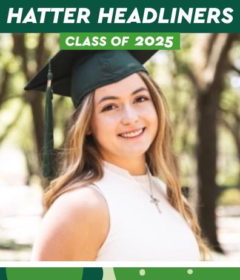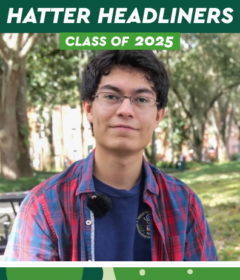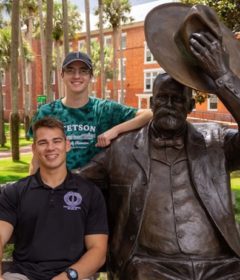Ukrainian Roundtable Highlights Need for Academic Analysis, Continued Support
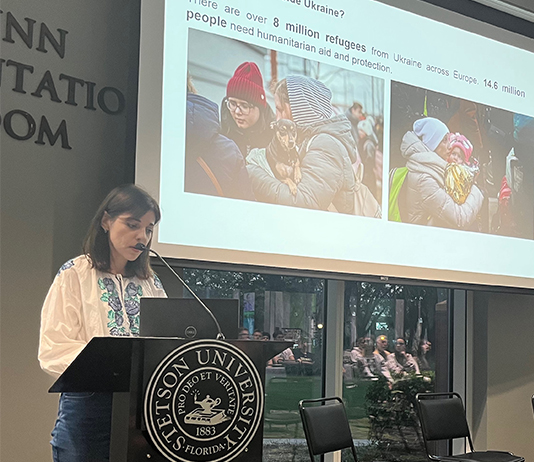
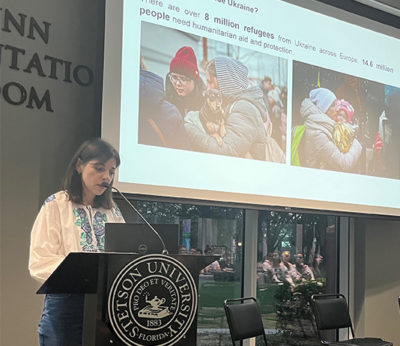
As the war in Ukraine rages on, so does Stetson’s support of those displaced by war, as well as research and education to understand how the conflict happened in the first place.
A Feb. 21 roundtable discussion and Q-and-A session was hosted by SPREES (Stetson’s Program in Russian, East European and Eurasian Studies) to bring the past decade of war in Ukraine into focus.
SPREES was formally known as “Russian Studies” until 2014 when the name was changed. The organization has been a part of Stetson’s campus for 65 years with a goal of training students to analyze and interpret the territory, people, history, language and cultural practices of the Eurasian landmass from a multidisciplinary perspective.
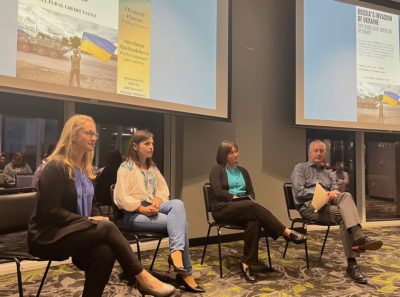
Fast forward to present day. During the roundtable, participants were Martin Blackwell, PhD, visiting professor of History; Elizabeth Plantan, PhD, assistant professor of Political Science; Mayhill Fowler, PhD, associate professor of History and director of SPREES; and Olena Kolupayeva, PhD, visiting teacher-scholar for the Brown Center for Faculty Innovation and Excellence. All gave remarks about their roles of teaching as it relates to the war in Ukraine. The professors provided insight about how they are personally connected to the war-ravaged country, and they shared historical context of the complex relationship between Russia and Ukraine.
More than 60 people were in attendance – a combination of students, professors and community members – to gain a robust understanding of how Ukraine and Russia came into this conflict, what’s being done to help locally and internationally, and what can be done now that the war has continued for two years.
‘Need to Remain Engaged’
“We need to remain engaged, but we also need to recognize better what we are studying,” said Blackwell. “As a historian, all I can do professionally to help this process along is to better explain how this area of the world is a place we should have been keeping a closer eye on after the collapse of communism.”
There are political scientists looking back to say that changes made to the constitution in 1993 allowed someone like [Vladimir] Putin [who first became president of Russia in 2000] to come [into office] and take advantage of [executive power],” Plantan noted during the Q-and-A session. “Those changes under [Boris] Yeltsin [president of Russia from 1991 to 1999] had unintended consequences in the future.”
As a result, the professors acknowledged they have retooled and renamed certain courses accordingly and with good reason.
‘Inspire Students to Study Ukraine’
“No one in college learns enough about what’s really cool about Ukraine,” Fowler commented. “It’s hard to produce the next generation of scholars because very few people are offering this type of coursework in college that will inspire students to study Ukraine. They need to learn that Ukraine is not just a country of war.
“We talk a lot about Ukrainian resilience,” she continued. “But let’s pause and think what it takes to find that resilience and how we can be a part in supporting it long term. Ukraine is more than lives destroyed. It’s also about an incredibly rich, complex and fascinating culture that is surviving.”
And no one knows more about surviving through the conflict than the professor and three students from Ukraine who are calling Stetson “home” right now — thanks to fundraising support.
Two Ukrainian students, Yana Verbova and Yuliia Balan, are slated to graduate this May. Each has submitted applications to pursue graduate degrees in the States or in Europe this fall. A third student, Genevia Gayden, is a sophomore exploring the academic options of comparative politics and economics at Stetson. Meanwhile, Kolupayeva was recently offered a two-year contract position at Stetson as an assistant professor of practice in Journalism (effective this August). Her official job title is Brown Visiting Teacher-Scholar Fellow in Communication and Media Studies.
All are making the most of their opportunities despite constant worry for their friends and family back home.
Kolupayeva spoke at the roundtable about one of her Stetson courses in particular: Media Literacy. She is teaching students how to discern false propaganda from real news at a time when “fake news” is abounding – such as Ukraine sending weapons to Hamas and ISIS being a Ukrainian “partner.” Hurting the Ukrainian cause, that fake news can be easily dispelled if one knows how to examine stories, she said.
‘Deeply Meaningful’
Kolupayeva also expressed how deeply appreciative she feels, along with her family and friends, regarding Stetson’s continued commitment to support them.
“For me, as a Ukrainian displaced scholar and a person directly affected by war, arranging a roundtable discussion to mark the second anniversary of the war in Ukraine is deeply meaningful,” Kolupayeva said. “It’s not just about acknowledging the struggles faced by my homeland, but also about giving me a platform and a voice to share my experiences and perspectives on the situation. Moreover, it creates a sense of community, which is invaluable to someone like me who is far from home. This support means recognition, empowerment and a sense of belonging in my academic journey.”
This sentiment was echoed by the three students, as well.
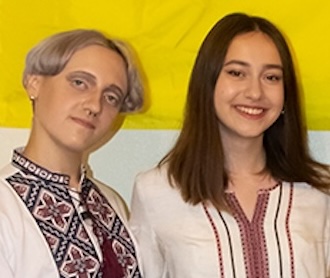
“I appreciate that the discussion is switching to a more academic angle,” Gayden said. “Papers, research and books on Ukraine are now being written by students, faculty and academics. It’s important, at this point in time, to finally establish a space for discussion for those who know what Ukraine is – because that’s what is extremely valuable to establish more lasting academic presence in this already small field.”
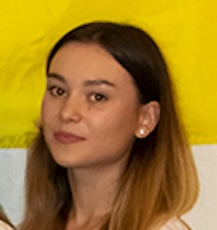
“Throughout these two years,” said Balan, “Stetson has become my second home. I can’t convey how much I am grateful to the Stetson faculty, especially Dr. Fowler, Dr. Plantan and Dr. Blackwell, donors, students, and any other people for bringing us here and giving us the ability to study in a peaceful country. I was happy to see the large number of guests who came to this event because it indicates that people are interested in learning more. Events like the roundtable help remind us that the war is still going on and that the Ukrainian people need more help.”
Added Verbova: “I feel absolute gratitude to Stetson University, that constantly organizes various events to broaden people’s horizons, to spread awareness about Ukraine not only as the country of war, but it is also done to show the world that such a country, which is rich in its history, extraordinary customs and traditions, is extremely resilient and fights till the end against all odds. Ukrainians are such a nation that will never give up no matter what.”
-Trish Wieland

